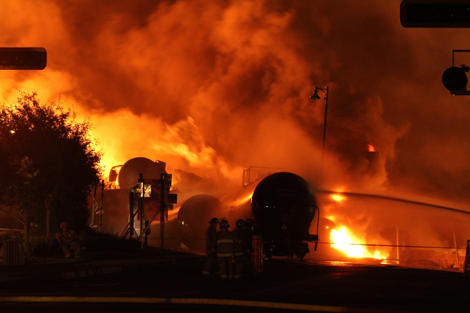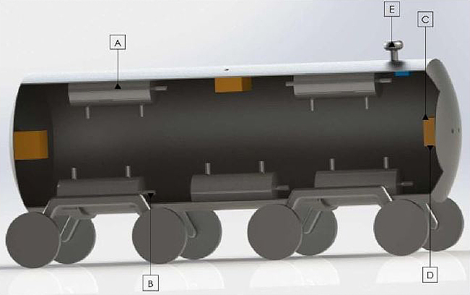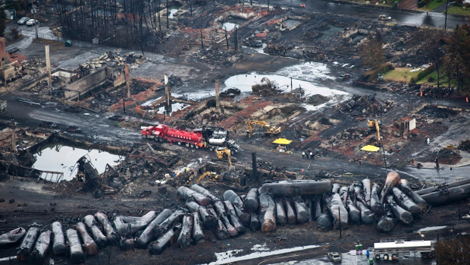
The Lac-Mégantic rail disaster claimed the lives of 47 people, inspiring the Safer Rail Car designs for flammable rail cargo
A new design is aiming to solve the explosive issue of train derailments carrying flammable fuels through smart sensors.
The ‘smart tank’ rail car to transport crude oil or any type of flammable fuel relies on sensors detecting collision or uncontrolled rolling, much like those that deploy car airbags.
When sensors trigger, small tanks inside the fuel cars deploy a mix of water and surfactants into the oil or fuel through high-pressure nozzles, creating an emulsion that’s significantly less flammable than the raw oil or fuel, rendering it less likely to explode.
If the tank car is punctured in the collision, the oil or fuel that leaks out will also be much less susceptible to sparks and less likely to ignite.
In addition to the surfactants that reduce flammability, a small tank of norbornene, an organic compound that increases the viscosity of crude oil upon contact, is released.

Featuring smart sensors, the tank can deploy surfactants to create less flammable contents, a jellifying agent for containment, and a gas pressure release valve to limit explosions
Once deployed, norbornene turns the contents of the rail car into a gel mixture that would be easier for responders to contain, and slower to leak into the surrounding environment.
The design also includes a gas pressure sensor and release valve to relieve explosive pressure inside the tank.
All the components are possible to retrofit inside the DOT-111 and DOT-112 tank car models currently used for shipping flammable liquids by rail, and his project included a cost analysis demonstrating its economic viability.

The design can be retrofitted, hopefully to help avoid future tragedies rail cargo tragedies
The Safer Rail Car won University of Toronto engineering student Iman Chalabi top prize at the Minerva Safe Design Awards.
“I’ve always wanted to participate in the Minerva competition and have had several ideas over the past few years,” said Chalabi. “But just recently I was reading a news article about the accident in Quebec [where a train carrying crude oil derailed resulting in fire and explosion, killing 47] and I decided I wanted to work on that problem.”
The project was supervised by Professor Graeme Norval in the Department of Chemical Engineering & Applied Chemistry, and Professor Nazir Kherani, which helped Chalabi decide on the best materials for his plan.






